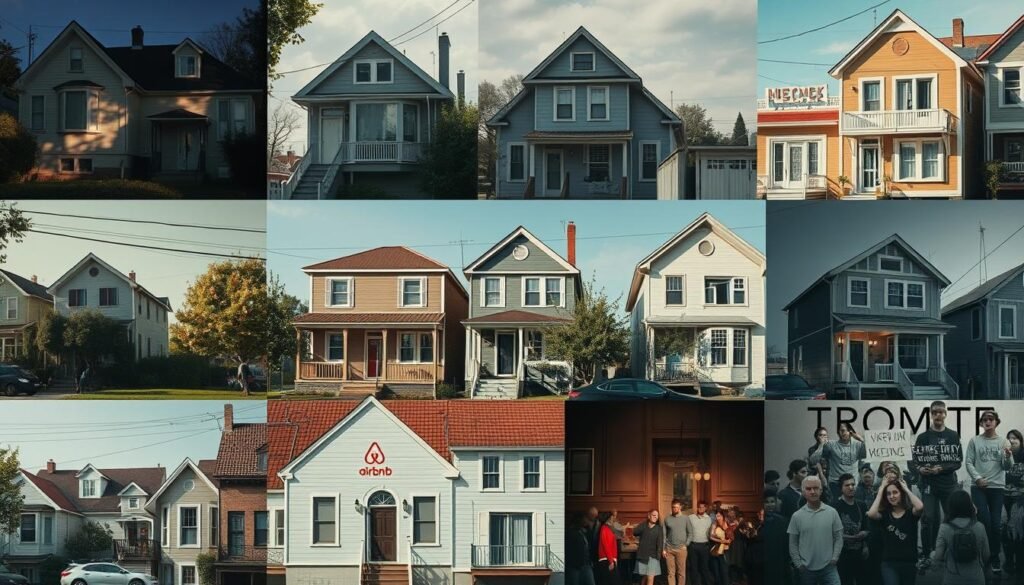The rapid growth of Airbnb, the popular short-term rental platform, has presented both opportunities and challenges for cities around the world. As this sharing economy phenomenon continues to disrupt traditional hospitality industries, municipal governments are grappling with the complex task of regulating Airbnb and other short-term rental services. This article examines how cities are navigating the Airbnb landscape, exploring both the successes and failures of their policy responses.
Airbnb regulations, short-term rental policies, and the broader challenges of the sharing economy have become pressing issues for urban centers globally. This article delves into the nuanced impacts of Airbnb on local economies, housing markets, and tourism industries, offering insights that can inform effective policy-making strategies. By analyzing a range of case studies, this piece aims to provide a comprehensive understanding of the multifaceted dynamics between cities and the Airbnb platform.
Key Takeaways
- Cities worldwide are grappling with the rise of Airbnb and short-term rentals, leading to a range of regulatory responses.
- Successful cities have found ways to balance the economic benefits of Airbnb with the need to address housing affordability and community concerns.
- Ineffective regulations can result in enforcement challenges and unintended consequences, such as the displacement of long-term residents.
- Collaboration between local governments, Airbnb, and community stakeholders is crucial for developing sustainable short-term rental policies.
- Leveraging data analytics and smart solutions can help cities better manage the short-term rental market and its impact.
Introduction to the Airbnb Phenomenon
In recent years, the rise of Airbnb has dramatically transformed the short-term rental market. As a global leader in the sharing economy, Airbnb has experienced remarkable Airbnb growth, disrupting traditional hospitality industries and profoundly impacting local economies worldwide.
Overview of Airbnb's Market Presence
Airbnb’s innovative platform has quickly become a dominant force in the short-term rental market, with a presence in over 220 countries and regions. The company’s expansive network of hosts and listings has provided travelers with a diverse array of accommodations, offering a unique alternative to traditional hotel experiences.
Implications for Local Economies
The rise of Airbnb has had significant local economic impact on the communities it serves. By providing individuals with the opportunity to earn additional income through short-term rentals, Airbnb has created new revenue streams and job opportunities for host communities. Additionally, the platform has attracted increased tourism, generating additional revenue for local businesses and governments.
“Airbnb has revolutionized the way we travel, offering a diverse and personalized experience that traditional hospitality often lacks.”
However, the rapid growth of Airbnb has also brought about a range of challenges for cities and municipalities, as they navigate the complex task of balancing the benefits of short-term rentals with the need for effective regulation and oversight. As the Airbnb phenomenon continues to evolve, understanding its broader implications on local economies has become a pressing concern for policymakers and community stakeholders alike.
Positive Impacts of Airbnb on Cities
While the rise of Airbnb has brought about challenges for cities, it has also unlocked significant opportunities for economic growth and tourism development. The Airbnb benefits extend far beyond the convenience of short-term rentals, as host communities are experiencing a tangible tourism growth and local economic development.
Economic Boost for Host Communities
Airbnb has enabled individuals to become micro-entrepreneurs, empowering local residents to supplement their incomes by hosting travelers in their homes. This has had a ripple effect on the surrounding community, as Airbnb guests often patronize nearby small businesses, contributing to the overall economic vitality of the area.
- A study by the Brookings Institution found that Airbnb hosts in the United States earned a median of $7,500 per year, providing a valuable source of supplemental income.
- In cities like New Orleans, Airbnb has been credited with supporting the revitalization of historically underserved neighborhoods, empowering local residents and fostering a sense of community pride.
Increased Tourism Revenue
The presence of Airbnb has also had a positive impact on tourism, as it has made travel more accessible and affordable for a wider range of visitors. This, in turn, has led to an influx of tourism growth and increased revenue for local businesses and municipal governments.
- A study in Los Angeles found that Airbnb guests spent an average of $1,100 per trip, with a significant portion of that spending going towards local businesses and services.
- In Barcelona, Airbnb has been credited with contributing to a 12% increase in tourism revenue over a five-year period, highlighting the platform’s potential to drive local economic development.

As cities continue to navigate the complexities of short-term rentals, it is clear that Airbnb has the potential to provide tangible economic benefits when effectively integrated into the local ecosystem. By fostering a collaborative approach and striking a balance between regulation and opportunity, cities can harness the power of Airbnb to drive sustainable tourism growth and local economic development.
Regulatory Challenges Faced by Cities
As the short-term rental market continues to grow, cities across the globe are grappling with complex regulatory challenges. From zoning laws and land use regulations to the implementation of effective licensing and registration systems, municipalities are working to strike a balance between supporting local economies and preserving the character of their communities.
Zoning Laws and Land Use
Many cities find that existing zoning laws and land use policies are ill-equipped to handle the rise of short-term rentals. Residential areas may not be zoned for commercial activity, leading to conflicts over the legality of Airbnb and similar platforms. Cities must navigate these zoning issues to determine where short-term rentals can operate and how they can be appropriately integrated into different neighborhoods.
Licensing and Registration Requirements
Implementing effective licensing and registration systems for short-term rentals has proven to be another significant challenge for cities. Establishing clear requirements for hosts, ensuring compliance, and enforcing regulations can be resource-intensive tasks. Many municipalities struggle to strike the right balance between enabling entrepreneurship and preserving the integrity of residential communities.
| Regulatory Challenge | Key Considerations |
|---|---|
| Zoning Laws and Land Use |
|
| Licensing and Registration |
|

As cities navigate these regulatory challenges, they must find innovative solutions that balance the economic benefits of short-term rentals with the need to protect the integrity of local communities. Effective collaboration between policymakers, industry stakeholders, and residents will be crucial in shaping sustainable short-term rental policies.
Success Stories of Cities Embracing Airbnb
As cities grapple with the rise of Airbnb and other short-term rental platforms, some have managed to find a balanced approach that fosters successful Airbnb regulations, promotes city-platform collaboration, and supports sustainable tourism. Two notable examples are Portland, Oregon, and Barcelona, Spain.
Portland's Innovative Regulations
Portland, known for its progressive policies, has taken a unique stance on Airbnb. The city has implemented a comprehensive regulatory framework that balances the interests of hosts, guests, and the local community. By requiring Airbnb hosts to obtain a permit and follow specific guidelines, Portland has been able to ensure that the short-term rental market operates within the bounds of zoning laws and community standards.
Barcelona's Balanced Approach
Barcelona, a city that has grappled with the challenges posed by the rapid growth of Airbnb, has taken a more balanced approach. The city has worked closely with the platform to develop a set of regulations that protect the rights of residents while still allowing for the benefits of sustainable tourism. This collaborative effort has resulted in a more harmonious coexistence between Airbnb and the local community.

These success stories demonstrate that city-platform collaboration and a nuanced approach to successful Airbnb regulations can lead to positive outcomes for all stakeholders. By striking the right balance between innovation and community needs, cities can harness the power of Airbnb while mitigating its potential drawbacks.
Case Study: New York City
As a prime example of the challenges cities face in regulating Airbnb, New York City’s approach stands out. The city has implemented some of the strictest short-term rental laws in the United States, aiming to address the impact of Airbnb on the local rental market and affordable housing crisis.
Strict Regulations and Compliance Issues
New York City’s laws prohibit the advertising of entire apartments for less than 30 days, unless the host is present during the rental. This has led to a crackdown on illegal Airbnb listings, with the city issuing thousands of violations to hosts and imposing hefty fines. However, enforcing these regulations has proven to be an ongoing battle, as many hosts continue to operate outside the law.
Impact on Affordable Housing
The Airbnb phenomenon has raised concerns about its impact on New York’s already strained affordable housing market. Critics argue that the platform has taken apartments off the long-term rental market, reducing the supply of affordable units and driving up rents. A study by the New York State Attorney General’s office found that Airbnb hosts with multiple listings accounted for 40% of the company’s revenue in the city, suggesting the platform is being used for commercial, rather than homesharing, purposes.
As the debate over Airbnb’s role in New York City continues, policymakers are grappling with the need to balance the potential economic benefits of short-term rentals with the preservation of affordable housing. The city’s experience serves as a cautionary tale for other municipalities seeking to navigate the complexities of regulating the Airbnb phenomenon.

Strategies for Sustainable Short-Term Rentals
As the popularity of short-term rental platforms like Airbnb continues to grow, cities are seeking innovative ways to create sustainable tourism ecosystems. Two key strategies have emerged: community engagement initiatives and collaborations with local businesses.
Community Engagement Initiatives
Engaging local communities is crucial for developing sustainable short-term rental policies. Cities are implementing programs that encourage community-based tourism, where hosts work closely with neighborhood groups to ensure responsible practices and address any concerns. This can include forums, workshops, and feedback channels to foster open dialogues and build trust.
Collaborating with Local Businesses
Successful sustainable tourism models often involve partnerships between Airbnb hosts and local businesses. By collaborating with restaurants, shops, and other service providers, short-term rental operators can create holistic experiences that benefit the entire community. This can lead to increased local business partnerships and economic opportunities for residents.
For example, some cities have launched initiatives that connect Airbnb hosts with local tour guides, providing guests with authentic, immersive experiences while supporting the local economy. Others have brokered agreements between hosts and local hotels, allowing them to refer overflow guests to one another during peak seasons.

By prioritizing community engagement and strategic partnerships, cities can foster a sustainable tourism ecosystem that balances the interests of short-term rental platforms, hosts, and local residents. This collaborative approach helps to ensure that the benefits of the short-term rental industry are widely shared and the negative impacts are minimized.
Balancing Regulation and Opportunity
As cities grapple with the growth of Airbnb and other short-term rental platforms, striking the right balance between regulation and opportunity has become a critical challenge. Policymakers must navigate a complex landscape, ensuring that balanced Airbnb policies protect neighborhoods and communities while also fostering economic growth and innovation.
Best Practices for Regulating Airbnb
Successful cities have implemented regulatory best practices that address the unique needs of their communities. These approaches often include:
- Establishing clear registration and licensing requirements for hosts
- Implementing zoning restrictions to limit the concentration of short-term rentals in residential areas
- Enforcing compliance through regular inspections and penalties for violations
- Collaborating with Airbnb and other platforms to share data and streamline enforcement
Pitfalls in Overregulation
While regulation is necessary, overregulation risks stifling the economic benefits of short-term rentals. Cities must be vigilant to avoid measures that:
- Impose overly burdensome administrative requirements on hosts
- Severely limit the number of available short-term rental units
- Fail to address the unique needs of different neighborhoods and communities
By finding the right balance, cities can harness the potential of short-term rentals while protecting the character and livability of their communities.

“The key is to create a regulatory framework that fosters innovation and entrepreneurship while also addressing the legitimate concerns of residents and neighborhoods.”
The Role of Technology in Management
As cities grapple with the challenges posed by the rise of short-term rental platforms like Airbnb, many are turning to innovative smart city solutions and data-driven policy to effectively manage this dynamic industry. By leveraging the power of technology, municipal governments are finding new ways to monitor, regulate, and collaborate with short-term rental technology providers.
Smart Solutions for Short-Term Rentals
From automated registration and licensing systems to advanced data analytics tools, cities are developing sophisticated smart city solutions to streamline the management of short-term rentals. These cutting-edge technologies enable municipalities to track rental activity, identify compliance issues, and enforce regulations with greater efficiency and accuracy.
- Automated registration and licensing platforms that simplify the registration process for hosts
- Monitoring and enforcement tools that use geospatial data and machine learning to identify unlicensed or non-compliant listings
- Integrated platforms that allow for seamless communication and collaboration between cities, short-term rental platforms, and local communities
Data Analytics in Policy Making
In addition to technological solutions, cities are increasingly relying on data-driven policy to guide their approach to short-term rentals. By analyzing comprehensive data on rental activity, occupancy rates, and community impact, municipal governments can make more informed decisions and develop regulations that strike a balance between fostering economic growth and preserving the character of local neighborhoods.
- Leveraging data analytics to identify hot spots, monitor trends, and assess the long-term effects of short-term rentals
- Collaborating with short-term rental platforms to share data and insights, enabling more effective policy development
- Adopting a flexible, iterative approach to regulation that can be adjusted based on ongoing data analysis and community feedback
As the short-term rental landscape continues to evolve, the strategic use of technology and data-driven policy making will be crucial for cities seeking to harness the benefits of this industry while mitigating its challenges. By embracing innovative smart city solutions and data-driven policy, municipalities can forge a sustainable path forward for the management of short-term rental technology.

Comparative Analysis of International Cities
As the global Airbnb regulations continue to evolve, cities around the world have adopted diverse approaches to managing short-term rentals. A comparative analysis of international cities reveals both successes and failures in navigating the cultural differences and international policy comparison surrounding this disruptive industry.
Successes in European Cities
Several European cities have emerged as leaders in striking a balance between promoting the economic benefits of Airbnb and addressing the challenges it poses. For instance, Amsterdam has implemented a comprehensive registration system, ensuring that all short-term rental operators comply with local regulations. Similarly, Barcelona has taken a collaborative approach, working closely with Airbnb to enforce zoning laws and protect affordable housing.
Failures in Major Asian Markets
In contrast, some of the largest Asian markets have struggled to effectively regulate the global Airbnb phenomenon. Cities like Tokyo and Seoul have faced enforcement challenges, with many unlicensed Airbnb listings continuing to operate in violation of local international policy comparison. The cultural differences and unique urban dynamics in these markets have made it particularly difficult to implement effective Airbnb regulations.

“The success or failure of Airbnb regulation largely depends on a city’s ability to understand and adapt to the unique cultural differences that influence short-term rental trends.”
Public Sentiment Towards Airbnb
As the popularity of Airbnb continues to grow, public opinion on its impact within communities has become increasingly divided. Surveys and community feedback have provided valuable insights into the diverse perspectives of residents across various cities.
Surveys and Community Feedback
Recent surveys have highlighted the complex nature of public sentiment towards Airbnb. While some residents have welcomed the economic benefits and increased tourism opportunities, others have voiced concerns over the impact on affordable housing and the disruption to neighborhood dynamics. Community feedback has further emphasized the need for a balanced approach that addresses the concerns of all stakeholders.
The Divided Opinion Among Residents
The divided opinion among residents is often influenced by factors such as the concentration of Airbnb listings in specific neighborhoods, the perceived benefits or drawbacks for local businesses, and the overall sense of community cohesion. In some cases, residents have actively participated in the policymaking process, advocating for stricter regulations or more collaborative solutions with Airbnb and local authorities.
| Positive Perceptions | Negative Perceptions |
|---|---|
|
|
As cities navigate the complexities of integrating Airbnb into their local communities, understanding the public opinion on Airbnb, community impact, and resident surveys will be crucial in shaping sustainable short-term rental policies that balance the needs of all stakeholders.
“The debate over Airbnb’s role in our city is an ongoing conversation, with residents on both sides of the issue voicing their concerns and perspectives. As policymakers, we must strive to find a middle ground that protects the character of our neighborhoods while also harnessing the economic opportunities presented by the short-term rental market.”

The Future of Short-Term Rentals
As the [future of Airbnb] continues to evolve, industry experts predict several emerging [short-term rental trends] that will shape the landscape in the years to come. One of the key drivers of this transformation will be the need for [adaptive policy-making] to keep pace with the dynamic nature of the market.
Emerging Trends and Predictions
Industry analysts foresee a surge in the popularity of niche vacation rentals, catering to specialized traveler preferences. This could include themed accommodations, eco-friendly properties, and experiences that offer a more immersive connection with local communities. Additionally, the growing demand for remote work and digital nomadism is likely to fuel the rise of long-term short-term rentals, blurring the lines between traditional hospitality and residential living.
Technological advancements will also play a significant role in the [future of Airbnb]. Innovations in data analytics, smart home automation, and AI-powered matchmaking between hosts and guests are expected to streamline the short-term rental experience. These solutions will empower cities and municipalities to better understand market trends and make more informed [adaptive policy-making] decisions.
Importance of Adaptive Regulations
As the [short-term rental trends] continue to evolve, [adaptive policy-making] will be crucial for cities to strike a balance between fostering innovation and addressing the potential challenges posed by the industry. Successful municipalities will be those that engage with all stakeholders, including Airbnb hosts, property owners, and local residents, to develop regulations that are responsive to the unique needs of their communities.
By embracing [adaptive policy-making], cities can create a framework that supports the growth of the short-term rental market while mitigating issues such as housing affordability, neighborhood disruption, and tax compliance. This approach will allow cities to capitalize on the economic benefits of [the future of Airbnb] while ensuring a sustainable and harmonious coexistence between vacation rentals and local communities.

Lessons Learned from Cities' Experiences
As cities across the globe grapple with the impact of Airbnb and short-term rental platforms, a wealth of valuable lessons can be gleaned from their successes and failures. This section explores the key takeaways that can inform Airbnb policy lessons, regulatory successes and failures, and urban planning insights for municipalities seeking to strike the right balance between promoting economic growth and preserving the integrity of their communities.
Key Takeaways from Success Stories
Cities like Portland and Barcelona have demonstrated that a collaborative, nuanced approach to Airbnb policy lessons can yield positive results. These cities have implemented innovative regulations, fostered strong partnerships with short-term rental platforms, and engaged with local stakeholders to address community concerns. By embracing the economic opportunities presented by Airbnb while mitigating its potential drawbacks, they have set a precedent for sustainable regulatory successes in the short-term rental market.
Mistakes to Avoid
On the other hand, the experiences of cities like New York serve as cautionary tales, highlighting the pitfalls of overly restrictive Airbnb policy lessons and the challenges of enforcing compliance. Poorly-designed regulations, a lack of stakeholder engagement, and a failure to adapt to evolving market conditions can lead to unintended consequences, such as the erosion of affordable housing and a growing underground short-term rental industry. These regulatory failures underscore the importance of nuanced, urban planning insights when addressing the complexities of the short-term rental economy.
| Key Lessons from Cities’ Experiences | Successful Strategies | Pitfalls to Avoid |
|---|---|---|
| Airbnb policy lessons | Collaborative approach, innovative regulations, stakeholder engagement | Overly restrictive policies, lack of enforcement, failure to adapt |
| Regulatory successes and failures | Balanced regulations, strong partnerships, community-focused initiatives | Compliance issues, erosion of affordable housing, underground rental market |
| Urban planning insights | Comprehensive, nuanced strategies, data-driven decision-making | Narrow focus, disregard for evolving market dynamics |
By learning from the diverse experiences of municipalities around the world, cities can develop Airbnb policy lessons, regulatory successes, and urban planning insights that foster sustainable, community-centric short-term rental policies. This balanced approach can unlock the economic potential of the sharing economy while preserving the character and livability of local neighborhoods.

“The key to a successful short-term rental policy is striking the right balance between promoting economic growth and preserving the fabric of our communities.”
Collaboration Across Stakeholders
In the dynamic landscape of urban short-term rentals, collaboration across stakeholders has emerged as a crucial element for sustainable solutions. The intersection of public-private partnerships, community engagement, and collaborative governance has proven to be a powerful approach in addressing the challenges cities face with the growth of platforms like Airbnb.
Government and Airbnb Partnerships
Recognizing the need for a balanced approach, some cities have forged productive partnerships with Airbnb and other short-term rental platforms. These public-private partnerships have facilitated open dialogues, information-sharing, and the development of mutually beneficial regulations. By working collaboratively, governments and Airbnb have been able to create frameworks that protect local communities while also embracing the economic opportunities presented by the short-term rental market.
Involvement of Community Organizations
Effective community engagement has been instrumental in shaping successful short-term rental policies. Local community organizations, advocacy groups, and neighborhood associations have become valuable partners in the decision-making process. Their insights and grassroots perspectives have helped cities develop collaborative governance models that address the unique needs and concerns of residents. This inclusive approach has fostered greater trust and acceptance of regulatory measures among local communities.
“Collaboration between governments, Airbnb, and community organizations is the key to unlocking the full potential of short-term rentals while ensuring the preservation of neighborhood character and affordable housing.”
As cities continue to grapple with the challenges posed by the rapid growth of short-term rentals, the importance of public-private partnerships, community engagement, and collaborative governance cannot be overstated. By embracing a cooperative mindset and incorporating diverse stakeholder perspectives, cities can strike a delicate balance between fostering economic opportunity and safeguarding the well-being of their communities.

Conclusion: The Path Forward
As cities continue to grapple with the challenges and opportunities presented by the Airbnb phenomenon, the path forward demands a renewed focus on adaptability and balance. The future of urban tourism hinges on the ability of local governments to craft sustainable short-term rental policies that address the needs of residents, businesses, and the broader community.
Need for Continuous Adaptation
The landscape of short-term rentals is rapidly evolving, and cities must be prepared to adjust their regulatory frameworks accordingly. Effective policies require continuous monitoring, data-driven decision-making, and a willingness to iterate and refine based on changing circumstances and community feedback. By staying attuned to emerging trends and the unique dynamics of their local markets, cities can ensure that their short-term rental regulations remain relevant and responsive.
Vision for Balanced Short-Term Rental Policies
The ultimate goal should be the development of balanced short-term rental policies that foster a thriving tourism industry while preserving the character and livability of communities. This delicate equilibrium can be achieved through collaborative efforts among local governments, Airbnb, and other stakeholders. By prioritizing transparency, community engagement, and a nuanced understanding of the local context, cities can unlock the benefits of short-term rentals while mitigating their potential negative impacts. The path forward demands an unwavering commitment to finding creative solutions that balance the interests of all parties and ensure a sustainable future for urban tourism.
FAQ
How are cities handling the rise of Airbnb?
Cities worldwide are adopting a range of strategies to address the growth of Airbnb and short-term rental platforms. Some have implemented successful regulations and policies, while others have faced challenges in balancing economic opportunities and community impacts.
What are some examples of successful Airbnb regulations?
Cities like Portland and Barcelona have implemented innovative approaches, such as zoning regulations, licensing requirements, and collaborative partnerships with Airbnb, to address the unique needs of their communities.
How have some cities failed in their attempts to regulate Airbnb?
New York City’s strict regulations and enforcement challenges have highlighted the complexities of managing short-term rentals, particularly in addressing the impact on affordable housing. Overregulation can also backfire, leading to unintended consequences.
What are the key regulatory challenges cities face with Airbnb?
Cities often struggle with conflicts between short-term rental platforms and existing zoning laws, land use regulations, and the implementation of effective licensing and registration systems. Striking the right balance between regulation and opportunity is a common challenge.
How has Airbnb impacted local economies and the hotel industry?
Airbnb has provided economic benefits for host communities, including increased tourism revenue and job creation. However, it has also disrupted traditional hospitality industries, leading to tensions and policy debates.
What are the implications of Airbnb for affordable housing?
In some cities, the proliferation of Airbnb listings has been linked to the reduction of long-term rental housing stock, exacerbating affordable housing challenges. Addressing this impact has become a key priority for many local governments.
How can cities promote sustainable short-term rentals?
Strategies include community engagement initiatives, collaborations with local businesses, and the development of balanced regulatory frameworks that support responsible tourism and economic development.
What role does technology play in managing short-term rentals?
Cities are leveraging various technological solutions, such as data analytics and smart monitoring systems, to improve the enforcement of regulations and make more informed policy decisions.
How have different international cities approached Airbnb regulation?
Comparative analysis shows that European cities have generally been more successful in implementing effective Airbnb regulations, while major Asian markets have faced greater challenges due to cultural and regulatory differences.
What is the public sentiment towards Airbnb in cities?
Public opinion on Airbnb is often divided, with surveys and community feedback highlighting both positive and negative perceptions of the platform’s impacts on local neighborhoods and communities.



